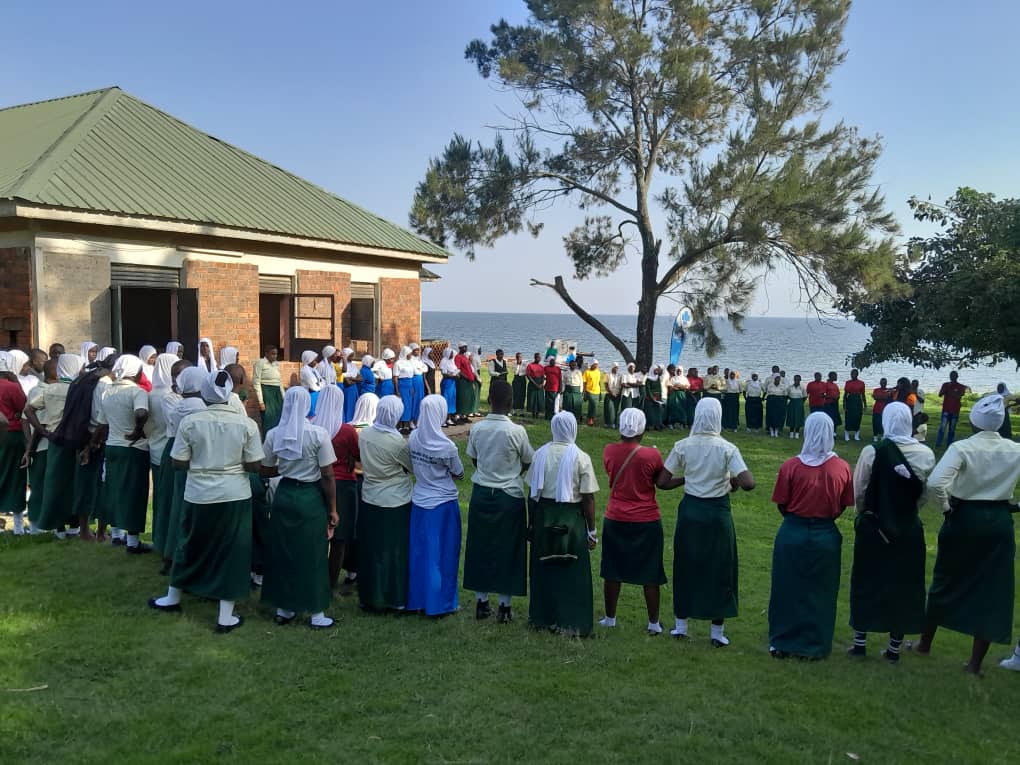
ENTEBBE – Family Medical Point – FMP, a not-for-profit organization on Friday educated students at Entebbe Girls School in Kingungu fishing landing site on menstrual hygiene management.
This is a deliberate move by the organization to advance girls’ education through providing access to accurate sexual reproductive health and rights information and services.
Menstrual health hygiene is both a human rights and a health issue, where women and girls are entitled to live a life of dignity. According to the UN Sustainable Development Goals (2015-2030), all nations should work towards ensuring healthy lives and well-being for all at all ages (SDG 3).
In Uganda, insufficient MHM in schools contributes to 30% of girls dropping out of school and many more miss 8 school days each term during menstruation days. In a study conducted by SNV in 140 schools located in seven districts of Uganda; 70% of the adolescent girls acknowledged that menstruation affected their optimal education performance, while 77% of girls ‘indicated missing averagely 2-3 school days per month, lack of sanitary pads as the main reason for girls being absent from school.
Through their Stay in School intervention, FMP is supporting 1000 school girls in fishing communities within Wakiso district to access free menstrual cups to support menstrual hygiene management.
According to them, studies in the fishing communities of Kingungu, Nakiwogo, Kasenyi and Guuda show that 45% of girls who drop out of school are as a result of inability to access menstrual hygiene management commodities and many more miss out about 10 – 18 days of studies each term during menstruation days.
Ms. Polyne Nabwire – Programmes and Communication Coordinator at Family Medical Point says that many girls in school are not aware of their SRHR thus standing up to equip them with the right information.
“…how they can approach the challenges they face like sexual gender-based violence.”
She added, “…being a fishing community, girls get advances from men and sometimes they do not know how to handle them.”
She explained that menstrual hygiene is still a challenge, especially, in hard-to-reach areas where some cannot afford pads.
“They have to fold clothes and maybe use reusable ones. So we are here to guide them on which menstrual products they can use because some girls here didn’t know how menstrual cups looked.”

Ms. Nabwire decried stigma associated with menstruation noting that men think that it’s a women’s problem. This, she said, has hindered most girls from discussing it with their male teachers, fathers and male guardians. “So there is a need for male involvement.”
During an outreach, they showed girls educative films to demonstrate to students the dangers of engaging in unplanned, unprotected, and early sexual behavior.
This, she noted was driven at showing the students the dangers of engaging in sexual behaviour when they are still in school, like risks of getting teenage pregnancies, dropping out of school, and getting STDs.
Nabwire says in most cases, teachers talk about these but are not well elaborated.
“I could see the shock on the faces of the girls when watching the movies.”
She encouraged the girls to seek support when they face challenges related to SRH; STI treatment, support after Sexual and Gender Based Violence, and teenage pregnancies.
Cedikol Enock, incharge of FMP explained that when girls cannot access pads and resort to other means, they may end up getting infections due to poor menstrual hygiene.
“There are a lot of UTIs one can get. We got information that some girls use unclean towels. It’s always good to wash your hands before and after using pads and strictly use the pads or very clean clothes to up the hygiene during menstruation.”
Ms. Nabule Sharon – a S.6 student at Entebbe Girls School commended FMP for the services rendered to them – noting that it will help them a lot as girls.
She noted, “It’s irritating for a girl to be in her periods and has no pad. A teacher is in class, you realise you are in a pool of blood, you can’t concentrate, you can’t move out, it becomes so hard.”
“I want to appeal to our parents to make sanitary pads essential for girls and in plenty. Fellow girls, ensure to always have a pad in your bag because you never know, your menstrual cycle may change.”
She added, “From the videos we watched, I was so shocked, some diseases I didn’t know how they attack and I want to ask my fellow girls to take these things serious.”
Why Fishing Communities and scale up of Menstrual Cups?
Family Medical Point in 2023 piloted menstrual cup project in 04 in fishing communities in and around n Entebbe Municipality, Wakiso District. The data from the pilot showed that 82% of the girls who adopted the use of the cup reduced absenteeism from school, felt more confident and had improved performance in the term. The outcomes of the pilot have informed FMP to use the Global Giving platform to fundraise to advance access to menstrual cups by school girls.
Fishing communities remain the most marginalized in Uganda and report higher rates of Sexual Gender Based Violence and limited access to SRH services, exacerbating health risks and social stigmas. Highlighting the importance of Comprehensive sexual and reproductive health education and access to services.
Yet a single menstrual cup can support a girl’s education for 5 years!
About FMP:
Family Medical Point is a not-for-profit organization that advocates, promotes and provides rights-based comprehensive sexual and reproductive health services to young people, women, sexual minorities, marginalized and hard to reach and forgotten communities.
They enhance access to life-saving healthcare services, particularly comprehensive SRH services among minorities, key populations, marginalized communities and young people, empower women and girls and promote school-wide health.





